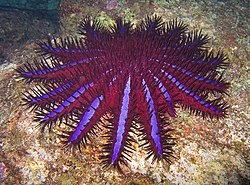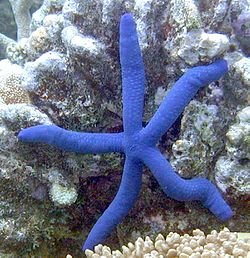Description
The order encompasses both tiny species, which are only a few millimetres in diameter, like those in the genus Asterina , and species which can reach up to 75 cm, such as species in the genus Thromidia . Almost all species in this order have five arms with tube feet. This order is primarily identified by the presence of conspicuous marginal ossicles, which characterize most of the species. Most members of this order have five arms and two rows of tube feet with suckers. Some species have paxillae and in some, the main pedicellariae are clamp-like and recessed into the skeletal plates. [2] This group includes the cushion star, [3] and the leather star. [4]
This page is based on this
Wikipedia article Text is available under the
CC BY-SA 4.0 license; additional terms may apply.
Images, videos and audio are available under their respective licenses.















